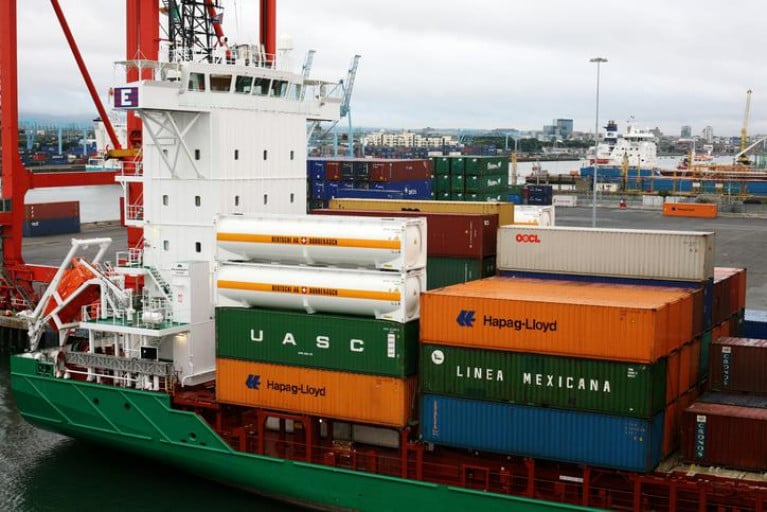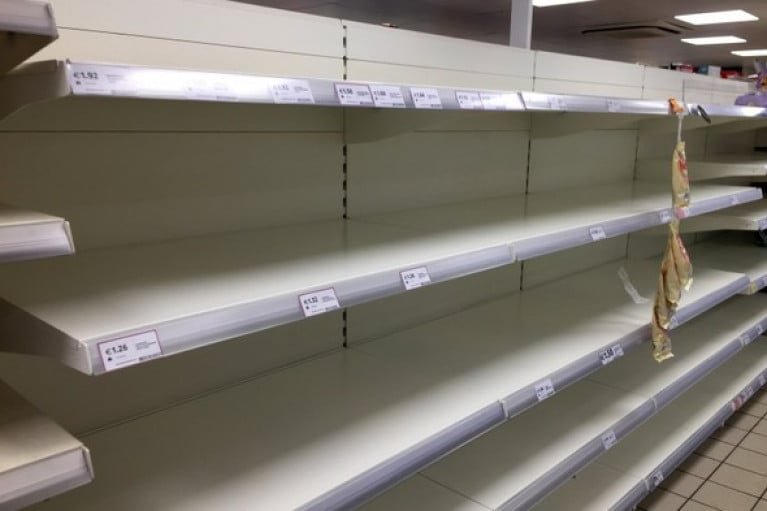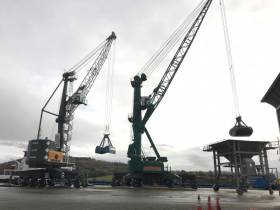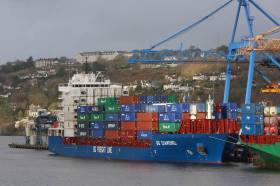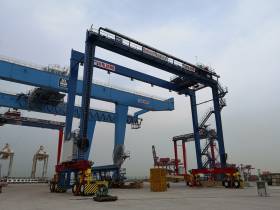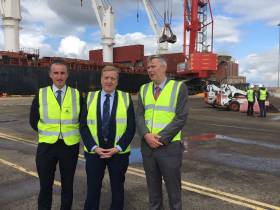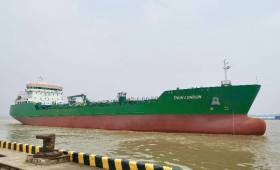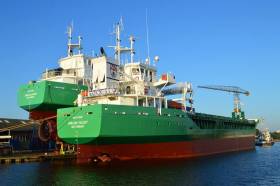Displaying items by tag: Ports & Shipping
Central Statistics Office (CSO) figures show that six of the seven main Irish ports handled 12.1 million tonnes of goods in the first quarter of this year - a decrease of 5.2% compared with the same time last year.
Goods forwarded from these ports amounted to 4 million tonnes, while a total of 8.1 million tonnes of goods were received.
The ports covered in these figures include Dublin, Bantry, Cork, Drogheda, Shannon and Waterford. Rosslare is not included in the figures.
The CSO said the total number of vessels arriving in the six Irish ports included in today's figures decreased by 147 (5.7%) in the first three months of the year, while the gross tonnage of all vessels arring fell by 3.1% to 50,992 tonnes.
To read more from RTE News and statistical data in detail click the CSO website here
Across the country's supermarkets have seen certain shelves completely emptied over the last week, as consumers stock up on tinned goods, hand soap and disinfectant products following confirmation of coronavirus cases in Ireland.
According to research by iReach, one in four people in Ireland have begun stockpiling food with a further 7% stocking up on fuel.
Sales of hand wash products (including hand sanitisers) alone were up 15% in February, Kantar said today.
Charlotte Scott, consumer insight director at Kantar said experts are expecting to see more of an impact towards the end of February and into March as an increased awareness of the virus will lead to an uplift in the sale f healthcare products.
“This coupled with the impact of Storm Jorge in late February may well lead to growing sales of goods typically associated with stockpiling like pasta and tinned or frozen food,” she said.
This increased activity should not be a cause for anxiety, however, according to Aidan Flynn, general manager of Freight Transport Association Ireland (FTA), who said there is no problem with the food supply chain.
Speaking to TheJournal.ie (which reported this story), Flynn of the FTA, said there are no barriers to transporting the kinds of products like tinned goods, pasta and hand soap that people are bulk buying and while supermarkets may sell-out of some products in a day, they will be able to very quickly restock their shelves.
Boost for Port of Waterford as New €3.5m Crane Delivered
Cargo handling capacity has been boosted by a Waterford based shipping agency by investing in a new mobile harbour crane with an innovative design that reduces its carbon footprint.
South East Port Services provide stevedoring, warehousing and ships agency services to shipping and client companies at the Port of Waterford in Belview.
The Liebherr LHM 280 was purpose-built for the port services company by Liebherr in Rostock, Germany, over a six-month period with Irish company closely involved throughout.
For more WaterfordLive reports.
Reduction in Volume of Goods Passing through Irish Ports
Goods in terms of volumes going through Ireland's ports between April and June this year fell in comparison with the same period last year, according to the Central Statistics Office.
The seven main Irish ports - Dublin, Cork, Rosslare, Drogheda, Shannon Foynes, Waterford and Bantry Bay - handled 12.3 million tonnes of goods in the three months.
This is a decrease of 7.5% compared with the same three months of 2018.
Exports from these ports amounted to 4.3 million tonnes, an almost 9% fall on the same period last year, while there were 8 million tonnes of imports, a 6.7% decrease on the three months in 2018.
For more BreakingNews has a report.
Upgrade Investment of £40m for Belfast Harbour Container Terminal
In an announcement Belfast Harbour is to invest £40m to upgrade its container terminal, writes the News Letter.
Victoria Terminal 3 (VT3), where the upgrade will take place, connects Northern Ireland to global markets through European hub ports of Rotterdam and Antwerp.
Recently, Belfast Harbour launched its 2035 Strategic Outlook with plans to be the ‘Best Regional Port in the World’ and a ‘Smart Port’ by investing in new technology and enhancing capacity.
It is expected that this upgrade will improve productivity and help customers grow and target new trade opportunities.
More here from this story to take place at VT3.
Another Record As Shannon Foynes Port Company Delivers Profit Levels
It was another record performance achieved at Shannon Foynes Port Company (SFPC) as the western port revealed its annual report for 2018.
According to SFPC, earnings before interest, tax, depreciation and amortisation (EBITDA) were €6.8million. As for operating profits in the period they remained exceptionally strong at €4.8million, €1.2million or 34% higher than five years ago, 2014. Revenue increased by 4.9%.
The company’s main ports on the Shannon Estuary, Foynes and Limerick, again achieved record tonnage levels, with an 11.7% increase in throughput. However, overall tonnage throughput was down by 5.5% to 10.7million due to a reduction of activity at privately managed terminals on the estuary.
This is the sixth year in succession that general cargo terminals have increased year on year.
Tonnages at Foynes and Limerick terminals for 2018 are some 50% higher at end 2018 than at end 2013 and exceed previous historically high tonnage levels experienced during 2006 by 11.2%.
To read more click the download here.
Brand New Chinese Built Tanker for Swedish Lake Based Shipping Group Arrives in Dublin Port
A brand new Chinese built Dutch flagged tanker ordered by a Swedish lake based shipping group arrived into Dublin Port from Wales this morning, writes Jehan Ashmore.
The L-class leadship Thun Lidkoping is the first of five 18,650 deadweight chemical product tankers which was completed by Avic Dingheng Shipbuilding Ltd in China.
The name chosen for the leadship operated by Thun Tankers (Erik Thun Group), derived from the shipowner group's inland homeport of Lidköping located on the southern shores of Lake Vänern. This is the third largest lake in Europe which is connected to the sea by shipping canals.
The L-class each with a cubic capacity of (98%) 20,665 m3, have a design developed in-house using Erik Thun AB's long experience of building sustainable, high quality vessels that operate as a major player in northern Europe.
In terms of environmental care, a concerted focus has been made with new regulations and customers’ needs taken into the key design and building process of this new class type.
The 148m tanker along with second sister, Thun London which too was delivered recently, operate in the Gothia Tanker Alliance network while crewing and technical management is conducted through MF Shipping Group.
This morning's arrival in Dublin Bay of Thun Lidkoping from Milford Haven, Wales, also involved Afloat to track a passing fleetmate, Thun Gemini which had departed Dublin Port having docked at Oil Berth No.1. It was at the adjacent berth that Thun Lidkoping berthed, though the maiden call of the newbuild tanker took place at the Irish port only last month.
As for Thun Gemini, the smaller G -Class tanker is returning to the same south Wales port which saw a passage offshore of Dun Laoghaire Harbour where Afloat reported of the tanker's once-off call to enable maintenance carried out at the south Dublin Bay port.
Such a call by the 2003 built 4,100dwt tanker was notably a rare occurance for such a vessel type which as previously reported took place three decades ago.
The Port of Galway is where Afloat.ie takes an impromtu look in at the city's dock where the focus on shipping movements concentrates on cargoships involved up to the end of this month, writes Jehan Ashmore.
In port this afternoon is Arklow Shipping's Dutch flagged short-sea trader, Arklow Valley which arrived yesterday from Belfast Harbour to engage in scrap steel. The 5,158dwat vessel was launched in 2016 as the fourth of 10 Royal Bodewes Eco-Traders commissioned by ASL.
It is somewhat unusual to see an ASL in the Port though what is a common sight is the Bláth na Mara, a domestic cargoship serving all three of the Aran Islands in Galway Bay. The operator Lasta Mara Teoranta is based at The Docks but at the pier beyond the enclosed single basin of the Dun Aengus Dock that forms the main port.
Typical cargoes carried on board Bláth na Mara range from food stuffs chilled and frozen, household goods, furniture, coal, cars, transit vans, tractors, horses in addition to various types of lifestock.
Recently, Islands Ferries announced plans to restore a direct passeger service from next year. The last such service which included freight was operated by O'Brien Ferries using the custom built Oileáin Árann.
At sea today is Bithav (6,834dwat) which is off the south Cork coast having departed with bitumen from Port Jerome, (Rouen) France. Likewise of Arklow Valley, this Dutch flag vessel will too remain in port until tomorrow when both vessels set sail in the morning.
On Sunday, Corrib Fisher is to make another arrival having loaded oil products from Cork Harbour at the Whitegate Refinery. The 6,090dwt tanker of UK firm, Jas Fisher Everard has in recent months taken over the routine duties of a fleetmate the aptly named Galway Fisher.
The 10 year-old replacement vessel is also on standby as an emergency oil spill response vessel for the European Maritime Safety Agency (EMSA).
The Irish Continental Group (ICG) has said it is totally prepared to meet the challenges posed by Brexit, whatever way those challenges emerge.
At the group’s annual general meeting, John McGuckian, ICG chairman, said, “we’re confident that whatever happens, we will react in an efficient and profitable way”.
Speaking to The Irish Times after the meeting, ICG chief executive Eamonn Rothwell said he’d prefer if sterling wasn’t so weak but he didn’t show concern on the basis that he doesn’t “know what Brexit is yet”. Mr Rothwell added that he doesn’t expect the group to suffer as 40 per cent of travellers on the Irish Sea are travellers originating in Ireland, while the remainder are British.
At the group agm there was no opposition to any of the resolutions, with remuneration practices in the company supported by over 90 per cent of shareholders. The shareholders dividend of 7.76 cent per share was also approved at the meeting. That dividend will be paid in June.
For more including the sale in 2017 of the former Isle of Innisfree (Kaitaki) to a New Zealand operator and results on ICG's ro-ro operations click here.
‘Connecting Ships, Ports & People’ On World Maritime Day
#WorldMaritimeDay - ‘Connecting Ships, Ports and People’ is the theme of this year’s World Maritime Day on Thursday 28 September.
Discussing the place of the International Maritime Organization (IOM) in achieving the UN’s Sustainable Development Goals, IOM secretary-general Kitack Lim says ports have a significant role to play in generating “increased employment, prosperity and stability through promoting maritime trade.”
To this end, the IMO will help UN member states “to develop and implement maritime strategies that address a wide range of issues, including the facilitation of maritime transport, and increasing efficiency, navigational safety, protection of the marine environment, and maritime security.”
Lim adds that “to be sustainable, human activities have to be balanced with the oceans’ capacity to remain healthy and diverse in the long term.”
A parallel event for this year’s World Maritime Day, similar to last year’s forum, will be held in Panama this October.




























